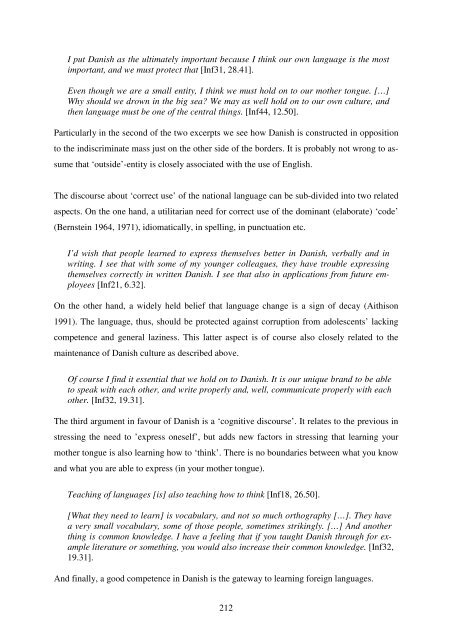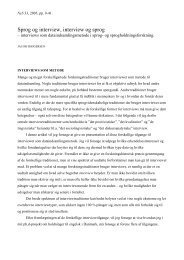Hør dog hvad de siger - Note-to-Self: Trials & Errors
Hør dog hvad de siger - Note-to-Self: Trials & Errors
Hør dog hvad de siger - Note-to-Self: Trials & Errors
Create successful ePaper yourself
Turn your PDF publications into a flip-book with our unique Google optimized e-Paper software.
I put Danish as the ultimately important because I think our own language is the most<br />
important, and we must protect that [Inf31, 28.41].<br />
Even though we are a small entity, I think we must hold on <strong>to</strong> our mother <strong>to</strong>ngue. […]<br />
Why should we drown in the big sea? We may as well hold on <strong>to</strong> our own culture, and<br />
then language must be one of the central things. [Inf44, 12.50].<br />
Particularly in the second of the two excerpts we see how Danish is constructed in opposition<br />
<strong>to</strong> the indiscriminate mass just on the other si<strong>de</strong> of the bor<strong>de</strong>rs. It is probably not wrong <strong>to</strong> as-<br />
sume that ‘outsi<strong>de</strong>’-entity is closely associated with the use of English.<br />
The discourse about ‘correct use’ of the national language can be sub-divi<strong>de</strong>d in<strong>to</strong> two related<br />
aspects. On the one hand, a utilitarian need for correct use of the dominant (elaborate) ‘co<strong>de</strong>’<br />
(Bernstein 1964, 1971), idiomatically, in spelling, in punctuation etc.<br />
I’d wish that people learned <strong>to</strong> express themselves better in Danish, verbally and in<br />
writing. I see that with some of my younger colleagues, they have trouble expressing<br />
themselves correctly in written Danish. I see that also in applications from future employees<br />
[Inf21, 6.32].<br />
On the other hand, a wi<strong>de</strong>ly held belief that language change is a sign of <strong>de</strong>cay (Aithison<br />
1991). The language, thus, should be protected against corruption from adolescents’ lacking<br />
competence and general laziness. This latter aspect is of course also closely related <strong>to</strong> the<br />
maintenance of Danish culture as <strong>de</strong>scribed above.<br />
Of course I find it essential that we hold on <strong>to</strong> Danish. It is our unique brand <strong>to</strong> be able<br />
<strong>to</strong> speak with each other, and write properly and, well, communicate properly with each<br />
other. [Inf32, 19.31].<br />
The third argument in favour of Danish is a ‘cognitive discourse’. It relates <strong>to</strong> the previous in<br />
stressing the need <strong>to</strong> ’express oneself’, but adds new fac<strong>to</strong>rs in stressing that learning your<br />
mother <strong>to</strong>ngue is also learning how <strong>to</strong> ‘think’. There is no boundaries between what you know<br />
and what you are able <strong>to</strong> express (in your mother <strong>to</strong>ngue).<br />
Teaching of languages [is] also teaching how <strong>to</strong> think [Inf18, 26.50].<br />
[What they need <strong>to</strong> learn] is vocabulary, and not so much orthography […]. They have<br />
a very small vocabulary, some of those people, sometimes strikingly. […] And another<br />
thing is common knowledge. I have a feeling that if you taught Danish through for example<br />
literature or something, you would also increase their common knowledge. [Inf32,<br />
19.31].<br />
And finally, a good competence in Danish is the gateway <strong>to</strong> learning foreign languages.<br />
212



